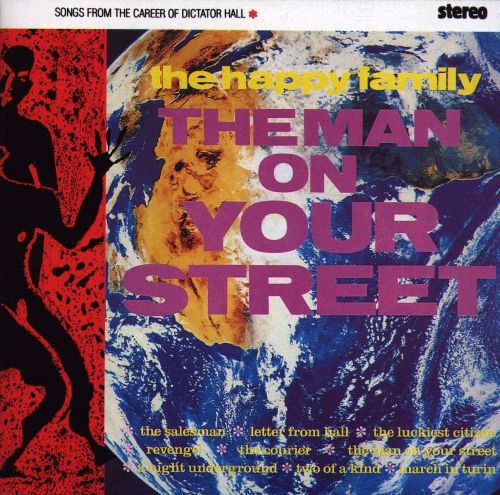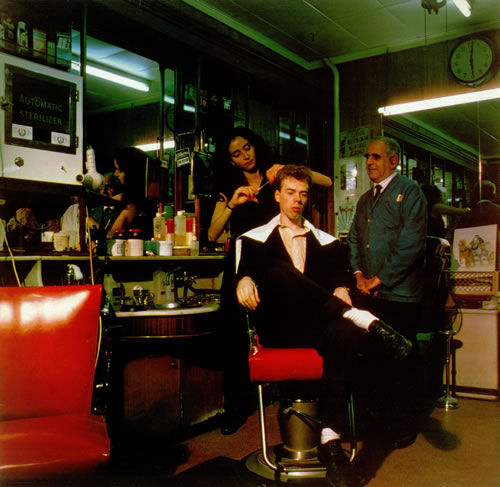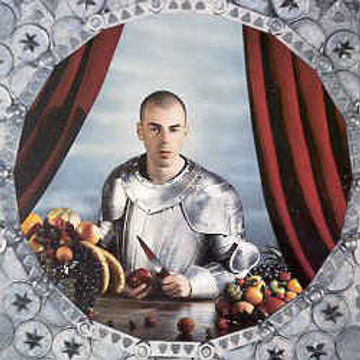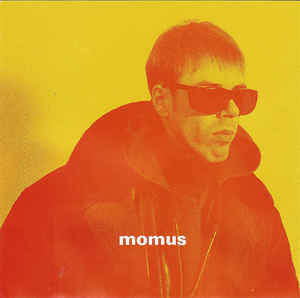Now's our chance! #2 - The Man on Your Street
- John Robinson
- Aug 14, 2019
- 7 min read
Updated: Aug 29, 2019
The Happy Family album was released in 1982, with evidence of a deliberate move away from both the sound and the lyrical style of the initial EP. Rather than gloomy and wistful, the album showed more spite towards the modern world and proposed blowing it up to some extent. Instrumentation on the album included saxophone and a clavinet apparently once owned by Midge Ure, and keyboards were a departure from the original Josef K sound. Furthermore, a blog indicates that 1981 was the year Nicholas' parents divorced, with his mother running away with "an unrepentant thatcherite", in his words. Now, I am no psychiatrist, but this event may have some bearing on both this album and many songs to follow.

The first thing to note is the bloody awful cover. My understanding is that the band discounted ideas from the label's regular designer and did.. this.. instead. There are several different fonts, and colours, none of which allow the lettering to stand out against an image of the world, the same world the album rails against. Listing the tracks at the bottom is presumably an attempt to make the album appear like a classic from the 60s or 70s, but in that case why then have the bizarre emaciated shadow monsters from the upside-down dancing on the left hand side? There's something tribal about that image, which is a concept well used at the time, but hardly matches the album cover or concept.
The concept is indicated by the top strip : Songs from the career of Dictator Hall. (In Stereo!) The story is broadly as follows.
An un-named salesman (we'll call him Mr. S) struggling to make ends meet for his wife Maria and their son Samuel, receives a letter from a man named Hall who has won the lottery and gone into right wing politics. Hall invites the family to his house in Lake Geneva. Presumably he has previously seduced Maria, because she promptly abandons Mr. S and runs away. (Yes, this is the point where a psychiatrist would nod and make notes). This event sends Mr. S into decline but before he dies he entreats his son Samuel to avenge him.
Meanwhile Hall has become President, married Maria and when their relationship goes a bit awry, rapes her and fathers a daughter with her. Presumably there is now an ellipsis of 18 years between sides 1 and 2 of the album. Samuel has now joined the Red Brigade and meets Hall's daughter - who has also been sexually abused by Hall. The two of them start an affair (the psychiatrist would be considering a conference and book deal by this point) and then set out to Turin to assassinate Hall. End.
So to the music:
The Salesman: A nursery song style riff and whistling, no less, introduces a description of the working life of the Salesman. There's the chiming guitars we would expect from this era but listen to the plinky plonk keyboards... this slice of life is almost reminiscent of the Kinks, a definite sixties throwback. Apparently a salesman must be bad to succeed, could this be a sideways comment on the record industry? The vocals are rather strained and a very middle class attempt to enter the milieu of the working class. It's a kind of music hall sound and a very irritating chorus.
Letter from Hall: The opening has a parping sound that has me singing Driving in my Car over the next bit. Restart...
Slow verse, faster chorus describing the man called Hall who apparently met and groomed this couple before he sent the letter. Again the chorus has a circus vibe to it. It's all very expository in terms of lyrics, we learn that Hall is bored on his yacht, and has been bad-mouthed in the press. There's a cool bridge after chorus 2 and a sweeping synth sound enlivens the third verse. The chorus is again very irritating though. Mr. S begs his wife to stop so they can "work on the family they planned", but they already have a son don't they?
The Luckiest Citizen: This is much better, a great melody and bouncy bass line in the verse. A genuinely pretty pop song. Which is appropriate of course, given he is tempting her in. A switch to minor tones from time to time indicates his rotten interior. Very interesting middle eight where Hall describes a need for "revolution, not domestic bliss", or more disturbingly, he wants Maria to fight back. The second half has the lyrics descend into misogyny, which fits the character fully, as he describes his need for a "mata hari meritocracy".. whatever that means.
Revenge! : This one kind of drifts over me.. it's stylistically very similar to Letter from Hall, and you get the point very quickly: Mr. S wants Samuel to take revenge. Mr. S also speaks very poetically for someone we were told was a working class salesman. There's saxophone on this that fits in surprisingly well. And handclaps! I can imagine Samuel sitting there holding Mr. S' hand and privately wishing he'd just hurry up and die though.
The Courier: This has a great chorus sung by the dead, apparently, regretting their mistakes in life and needing a courier (Samuel?) to carry their messages and do dirty deeds. It's not really clear who is employing Samuel - is it literally the forces of Hell?
The Man on Your Street: Musically we are back to the style of Letter from Hall, and this song is also from his perspective. There's a melancholy to Hall's musings here that almost makes you sympathise with him, as he tries to justify his way of life and his achievements. That doesn't last though.
The opening line: "Now at last I've mastered this business of living" has always stuck with me, I was disappointed to learn that "this business of living" wasn't an original phrase.
One of the great strengths of this track is the variety of sections it has, there's almost a progressive feel to it, and each style genuinely fits the mood of the lyrics. This is also the track that most reminds me of the Associates, just listen to the bass after "then again I've bred respect for virtue.."
This track also includes what would become a Momus staple, the calmly spoken monologue, often detailing some horrific sexual incident. Here Hall describes how he assaults his own daughter:
"I arrange for my ivy green limousine to break down amongst holly trees And seize a command performance from my beautiful daughter And as I commit this unnatural act by the shores of Lake Geneva I contemplate the fact that blood is much sexier than water."
Which is where any sympathy ebbs away.
The song ends with him calling the Citizen's Advice Bureau. Frankly, I think he's long past professional help.
A Night Underground: A bouncy ridiculously cheerful pop song with a squelchy synth line plays while we hear how Samuel has joined the Red Brigade. My favourite song on the album, I'm a sucker for a squelchy synth line. Samuel meets Hall's daughter here, and she ain't happy. The cheerfulness of the song juxtaposed with the squelch - I mean squick - of relations between the two just about allows you to accept it in narrative terms.
Currie namechecks Hegel here: Samuel is reading philosophy and tons of books "as safe as a sprig of deadly nightshade", which is a nice line. Momus throwing in the names of, and references to, philosophers and books you've never heard of is a recurring theme. Prepare to feel very stupid as the weeks go by. And while I think about it, why does the lyricist assume we know who Hegel is and who the Red Brigade were but doesn't trust us to know that nightshade is deadly?
Two of a Kind: The lovers go on a romantic excursion (albeit with murderous intent) through the Simplon Tunnel. The music is nondescript sub-Haircut 100 at this point. I have to point out the following rhyming couplet:
"We're still in Switzerland We're climbing fast I whisper, "Simplon" You shout, "At last!" "
They joke about being terrorists to the border guard - which would get you shot now - and go off through the tunnel.
The last minute and a half of the song consists of the following:
"Da da da da da
Da da da da
Da da da da da
Da da da da
Da da da da da
Da da da da
Da da da da da
Da da da da
Da da da da da
Da da da da
Da da da da da
Two of a kind
Do do do do do do do do do
Do do do do do do do do do
Do do do do do do do do do do
Do do do do do do do do do
Do do do do do do do do do
Do do do do do do do do do do
Do do do do do do do do do
Do do do do do do do do do
Do do do do do do do do do do
Do do do do do do do do do
Do do do do do do do do do
Do do do do do do do do do do
Do do do do do do do do do Do do do do do do do do do Do do do do do do do do do do"
Which is written in full in the CD lyric sheet. Never let anyone accuse Mr. Currie of pretentiousness.
March in Turin: A slower song, the guitar accompaniment on the acoustic is very similar to work that will emerge in early Momus tracks. The vocal delivery is more like what would follow as well.
The lovers wait in Turin to meet and shoot their target. We don't find out what happens, but we know they are about to execute their plan as the album ends. Running out into the bright sunlit courtyard all Butch and Sundance. The end has a descending run of church bells and we can only assume absolute carnage follows.
And that was it for the Happy Family. A bunch of demos for the album was released later in the decade as "This Business of Living" but no further new material. Currie had decided by now that bands had to operate as democracies, and ironically given the subject matter of this album, he wanted to be a dictator.






Comments